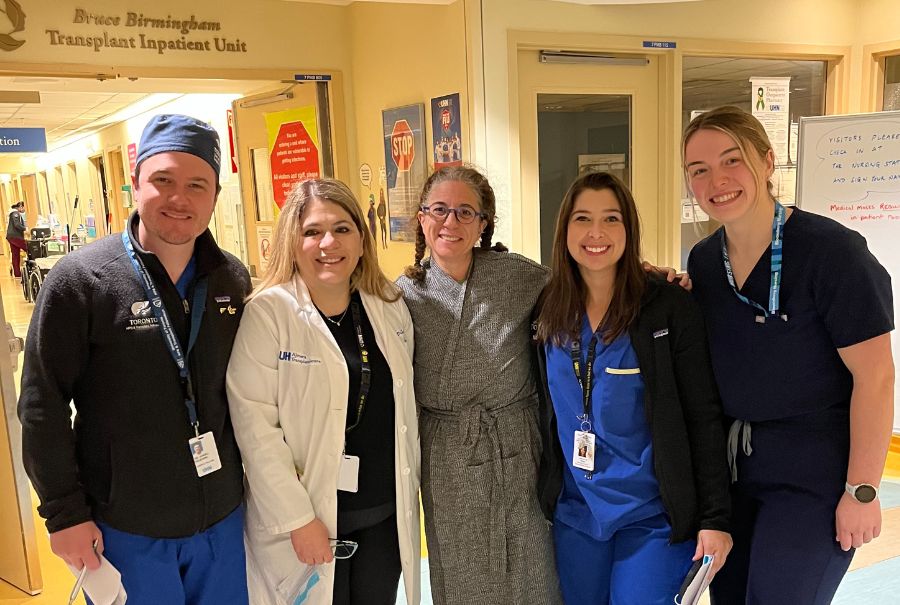
April is Irritable Bowel Syndrome (IBS) Awareness Month, which aims to spread the word about this common – but sometimes misunderstood – digestive condition.
What is IBS?
IBS is a chronic gastrointestinal condition. It is associated with symptoms including intermittent abdominal pain that is associated with alterations in bowel habits. This can take the form of constipation or diarrhea, or alternating between the two.
“Typically once it begins, there is no cure for irritable bowel syndrome,” says Dr. Colleen Parker, Staff Gastroenterologist at the Driscoll Family Digestive Health Centre. “It tends to be chronic and lifelong, but IBS can be fluctuant throughout the lifespan. People will tend to have periods of time where their symptoms are a bit worse and then they’ll get a little bit better, but they’re always at risk for it flaring up or getting worse again.”
A disorder at the intersection of the gut and the brain
IBS is one of a large group of conditions that are referred to as disorders of gut-brain interaction.
“It is among the most common and well-studied of the disorders of gut brain interaction, and so a lot of what we know about these conditions comes from learning about irritable bowel syndrome,” says Dr. Parker.
What this means is that the factors that contribute to the symptoms of IBS occur in the gut, the brain, and the communication between the two.
The gut becomes hypersensitive. In response to normal gut function – like food passing through – it begins to inappropriately send pain signals to the brain. As Dr. Parker explains, “In IBS, the area of the brain that senses things coming from the gut actually looks and functions differently than in people who don’t have IBS. The brain actually misinterprets those signals. The brain is interpreting it as a danger signal, and now it can’t ignore it.”
The brain enhances the pain signal, causing more pain. This causes the person with IBS to notice the pain more, further increasing the “danger” signals, creating a self-reinforcing cycle.
Not just a stomachache – how IBS impacts people’s lives
IBS is one of the most common diagnoses that cause people to miss work or school. Abdominal pain can get in the way of daily activities. For the subset of IBS patients who experience diarrhea, the need for frequent and urgent bathroom access can be stressful and can cause embarrassment. Feeling poorly, stress about their symptoms and concerns about being able to access a bathroom when they need one can cause people to stay home and miss out on work, school, social events and activities they enjoy.
A large proportion of IBS patients are young adults, receiving their diagnoses in their twenties or thirties. For many, this is a time of life when they are finishing school, getting into the workforce and starting families. The symptoms of IBS can get in the way during what is a busy, active stage of life for many people.
IBS can also make people living with it feel isolated. People can find it embarrassing to discuss their symptoms with family and friends – and sometimes even with their care provider. Reluctance to talk about their symptoms with their doctor can leave people struggling in silence, sometimes for years, delaying diagnosis and treatment.
Busting misconceptions about IBS diagnosis and treatment
Often, patients will undergo tests to rule out other potential causes for their symptoms – like inflammatory bowel disease, celiac disease or colon cancer. There are no scans, blood tests or biopsies that can diagnose IBS, but it can be confidently diagnosed based on typical symptoms. Sometimes this can lead people to feel that IBS is a catch-all diagnosis when their care team can’t identify other causes.
“The biggest misconception that I see in my clinic is that IBS is that diagnosis we make when we don’t know what’s going on with you,” says Dr. Parker. “That’s a big misconception. IBS is a very real condition with a very real set of diagnostic criteria. There are physiologic changes that happen in the body of patients who have IBS that are very real.”
A second major misconception? The belief that there are not options to treat IBS. While it is a chronic condition, treatments are available to manage symptoms and improve people’s day-to-day experience.
“Our toolbox for treating IBS is expanding,” says Dr. Parker. “There are options. I don’t want people to be afraid to bring up these symptoms to their care providers because we can give you strategies, tools and therapies that might help you out.”
Building the future of IBS care at UHN
Patients with IBS are seen through the gastroenterology clinics within the Driscoll Family Digestive Health Centre at UHN. These are multidisciplinary clinics, meaning patient care is provided by a team of care providers with different specialties – including physicians, nurses and dietitians – collaborating to deliver care.
This is important for treating IBS, which often requires a multidisciplinary approach. Treatment plans benefit from the team’s diverse expertise from medication options to supporting patients through dietary management and lifestyle changes.
At the same time, the team is developing the future of IBS care through education and research.
The Driscoll Family Digestive Health Centre trains up to three fellows annually, who come from across Canada and around the world to learn to manage IBS and other gastrointestinal disorders. Dr. Parker says, “We’re a major centre for training the next generation of GIs who are interested in taking care of this patient group. We’re able to share our clinical expertise with these trainees to support care locally at home, and also around the world.”
The team is currently building up an IBS research program within the Driscoll Family Digestive Health Centre. They have launched some exciting new projects including a study to learn how to better measure abdominal pain, which could help better evaluate treatments and improve pain management. They’re also exploring the link between mental health and IBS, and working to uncover more about how the gut brain interaction at the root of IBS works.
Through this research program, Dr. Parker and her colleagues will be able to continue pursuing exciting research projects like these that could lead to new treatment strategies and positively impact the lives of everyone with IBS.
“I think we are in an era where people have started to recognize how important this condition is, and how impactful it is on our patients,” Dr. Parker says. “There are research studies happening all the time where new therapeutic approaches are being developed. I think there is a lot of hope for patients who have IBS that there will be newer and newer options for them to help them function better.”

No one ever changed the world on their own but when the bright minds at UHN work together with donors we can redefine the world of health care together.


